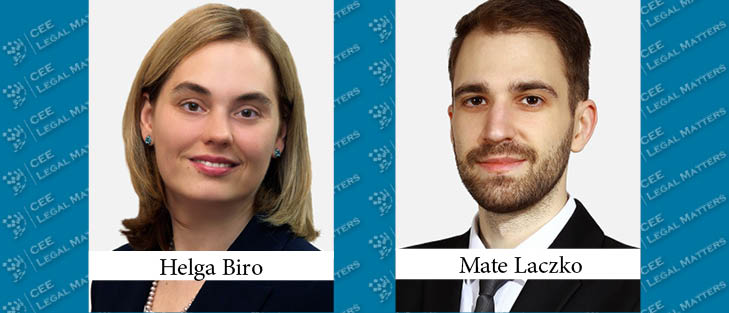Over the past five years, I have had the privilege of serving as a legal manager for clients across diverse industries, providing me with a unique perspective on the evolution of legal technology and the broader digital transformation within the legal sector. While it is true that the legal profession tends to be a late adopter of new technologies due to its inherent conservatism, I see a significant and positive shift in recent years.
Looking In: Marc van Campen of Van Campen Liem
In our Looking In series, we talk to Partners from outside CEE who are keeping an eye on the region (and often pop up in our deal ticker) to learn how they perceive CEE markets and their evolution. For this issue, we sat down with Marc van Campen, Partner at Van Campen Liem in Amsterdam.
The Corner Office: Legal Tech (to the Rescue)
In The Corner Office, we ask Managing Partners at law firms across Central and Eastern Europe about their backgrounds, strategies, and responsibilities. With industry-specific software emerging left and right, the legal industry was not left behind. To explore some of the trends in this regard, we asked: What are some of the specific legal tech platforms you use?
Bridging Academia and Practice: Summer Internship Programs
Nazali Tax & Legal Managing Partner Ersin Nazali and Kinstellar Managing Associate and Head of Employment Kristina Pavlovic talk about their firms’ summer internship programs – the crucial bridge between academic learning and practical experience for law students.
Charting Greece’s Comeback Story
Once known for its financial turbulence, the Greek economy is showing strong growth. Bahas, Gramatidis & Partners Managing Partner Marios Bahas and Drakopoulos Partner Mika Lalaouni discuss key sectors and major drivers of the turnaround.
Know Your Lawyer: George Zohios of AKL Law Firm
An in-depth look at George Zohios of AKL Law Firm covering his career path, education, and top projects as a lawyer as well as a few insights about him as a manager at work and as a person outside the office.
Slovenia’s Investment Hotspot: The Western Balkans
Over the past years, Slovenian businesses have increasingly turned their attention to the Western Balkans, identifying the region as a promising hub for investment and expansion. Ketler & Partners Partner Kevin Rihtar, Kavcic, Bracun & Partners Managing Partner Matej Kavcic, MP Law Partner Marko Prusnik, and Senica & Partners Managing Partner Katarina Kresal discuss key sectors of interest and examine the strategic advantages the Western Balkans offer to Slovenian enterprises.
SLO(w) to Expand: Slovenian Firms’ Regional Footprint
Despite the strength of domestic law firms in Slovenia, not a great number of major local players have engaged in direct expansions across the region. Senica & Partners Managing Partner Uros Cop and Kavcic, Bracun & Partners Managing Partner Simon Bracun explore the reasons behind this trend, examine attempts at regional alliances, and identify recent developments that may incentivize firms to pursue regional expansion.
Inside Track: Summer Recharge
In the Inside Track, General Counsels across CEE share the nuances of their roles, challenges, and strategies for success. As summer is a time to unwind, we asked: With summer here, what is your one favorite yearly activity to disconnect and switch off?
Inside Insight: Stathis Mihos of Pfizer
As Pfizer’s Legal Director overseeing Greece, Cyprus, Malta, and Israel, Stathis Mihos explores EU health policy advancements and the complexities arising from the pandemic and examines how artificial intelligence is dynamically influencing lawyers’ work.
Inside Insight: Mojca Logar of Petrol Group
Overseeing diverse sectors across multiple countries, Petrol Group Director of Legal Affairs Mojca Logar discusses the challenges and strategies in managing the group’s legal affairs and navigating complex regulatory landscapes, while emphasizing internal legal expertise and collaborating with external firms for specialized projects and new legislation.
Greece: From Product Liability to AI – Unlocking Life Sciences’ Potential
Greece’s vibrant life sciences sector is supported by a robust regulatory framework and expanding investment opportunities. In the following paragraphs, we will examine key aspects of product liability, intellectual property (IP), artificial intelligence (AI), and investment potential within the Greek life sciences landscape, highlighting the laws and regulations that shape the industry.
Latvia: Further Solutions to Drug Availability and Monitoring Problems
Following extensive discussions between industry stakeholders and state institutions, several crucial solutions have been identified to address the problems of drug availability and monitoring control. The primary aim is to ensure wider and faster access to medicinal products for patients in Latvia.
Czech Republic: Digitization of Healthcare – Telemedicine and Electronic Medical Records
Digitization is affecting many sectors and healthcare is no exception. It is a key tool for speeding up and streamlining processes that can significantly improve the quality and availability of medical care. In the Czech Republic, the overall level of digitization in healthcare is still low.
Estonia: Pharma Disputes – Weak Patents May Cost Originators Heavily in Disputes with Generics
It is not new that originator pharmaceutical companies try to block generic competitors from entering the market. Considering the recent developments in the Court of Justice of the European Union (CJEU), originators should tread carefully when defending their patents. Having a strong patent is crucial, and the consequences of failing to vet the strength of a patent could end up costly.
Lithuania: Balancing the Scales – Addressing Disparities Between Public and Private Healthcare
Healthcare is a fundamental component of any society, reflecting its core values and priorities. In Lithuania, the healthcare system is marked by a pronounced division between private and public hospitals. Lithuania’s healthcare services are divided into outpatient (ambulatory) and inpatient (stationary) services.
Hungary: Mid-Year Review of Significant Life Sciences Legal Developments
For the pharmaceutical industry in the Hungarian market, the first half of 2024 involved several legislative changes with significant practical implications. Some of these changes have yet to unfold their full impact, due to the lack of implementing regulations and prerequisite authority actions.
Ukraine: From Challenges to Change – Key Healthcare and Life Sciences Developments
Despite the ongoing full-scale invasion by the Russian Federation, the life sciences and healthcare sector in Ukraine is actively evolving to support the well-being of its population.






























